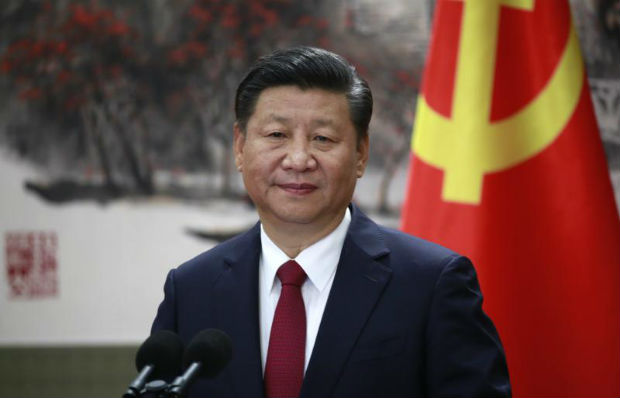
Xi Jinping emerged from China’s big political reshuffle with more power than any leader in decades. How will he use it?
Mr Xi brought the Communist Party’s twice-a-decade congress to a triumphant end, unveiling a leadership bench made up of proven allies and lacking a clear heir. Crucially, Mr Xi got his name and his ideology written into the party charter alongside Mao Zedong, acquiring a status that could see him holding sway over China well beyond the end of his term in 2022.
The consolidation of power in the hands of one man is a departure from the collective leadership that steered China through decades of unparalleled economic growth.
Mr Xi wants China to be a great power, projecting clout across the globe. At home, he’s promised greater equality and a thriving middle class.
That ambitious vision carries risks. Many investors have grown frustrated with the pace of economic reforms over the past five years. Capital controls and other investment barriers remain, while debt soars.
Now more than ever, the future of 1.4 billion people depends on one man. If Mr Xi doesn’t succeed, China won’t.
▪ TIGHTER GRIP ON POWER
— Arirang News (@arirangtvnews) October 25, 2017
China's president Mr Xi Jinping elevated to same status as Mao
#China #Mr XiJinping #Mao pic.twitter.com/Xu1hC9j3iJ
(Video Twitter/Arirang)
On Wednesday, China unveiled a new leadership team that lacked a clear potential successor to President Xi Jinping, raising the possibility he may seek to stay in office longer than his recent predecessors.
In starting his second five-year term as general secretary of the Communist Party, Mr Xi introduced new members of the Politburo Standing Committee, which includes Li Zhanshu, 67, a longtime confidant of his who prior to the major reshuffle worked as his effective chief of staff.
The members of the seven-strong committee, China's apex of power, appeared before the media in a room inside the Great Hall of the People in Beijing, a day after the ruling party concluded its twice-a-decade congress.
The four other new faces joining Mr Xi and Premier Li Keqiang on the committee are Vice Premier Wang Yang, Wang Huning, chief policy adviser to Mr Xi and his two immediate predecessors, Zhao Leji, head of the party's Central Organization Department, another confidant of the current leader, and Shanghai party boss Han Zheng.
Flanked by the six other members of the committee, Mr Xi expressed thanks to "all other members of the party for the trust they have placed in us."
"We will work diligently to meet our duty, fulfill our mission and be worthy of their trust," he told the media. "With decades of hard work, socialism with Chinese characteristics has entered a new era. We must get a new atmosphere and, more importantly, make new actions."
(Video YouTube/Arirang)
All five newcomers are in their 60s and therefore perceived as ineligible to succeed Mr Xi after his second term ends in five years.
The party did not promote to its highest-decision making body two senior members in their 50s, seen as potential next-generation leader candidates.
The two are Guangdong party boss Hu Chunhua, 54, and Chen Min'er, 57, a rising political star known as a Mr Xi loyalist, who became party chief of the mega-city of Chongqing in July after the sudden fall of Sun Zhengcai, once considered a contender for top leadership, over alleged corruption.
With the absence of a promising candidate, speculation further intensifies that the 64-year-old Mr Xi will be at the helm of the party beyond 2022.
Mr Xi and Mr Li, 62, were elevated to the standing committee in the second term of former leader Hu Jintao.
Mr Xi did not take questions when he met the press in the cavernous building in the heart of the Chinese capital, where the party's weeklong congress took place.
Instead, Mr Xi reiterated some future goals of the party, while noting that China has gone through "trials and tribulations."
"These experiences have taught us that peace is precious and development must be valued," he said. "With confidence and pride, the Chinese people will be steadfast in upholding our country's sovereignty, security and development interests."
But at the same time, he said, "We will also work with other nations to build a global community with a shared future, and make new and greater contributions to the noble cause of peace and development for all humanity."
For Mr Xi, the makeup of the standing committee and other central organs in his first term were a compromise influenced by his two immediate predecessors, Mr Hu and Jiang Zemin.
When Mr Xi rose to the top party position, he had few confidants around him. But he managed to sideline his political rivals through an aggressive anti-corruption campaign, with the help of 69-year-old Wang Qishan as its enforcer.
Ahead of the leadership reshuffle, there was speculation Mr Xi might bend the party's informal retirement age to allow his right-hand man Wang to stay on the committee.
But Mr Xi opted not to touch the unwritten norm, under which all members of the standing committee aged 68 or older at the time of a party congress must step down.
Mr Zhao, who was in charge of overseeing personnel affairs of the party, replaced Mr Wang as head of the Central Commission for Discipline Inspection.
Mr Wang still could assume a key government position in the near future.
The party's new Central Committee held its first plenary session on Wednesday and also decided on members of the Central Military Commission, which has overall control of the People's Liberation Army.
Xu Qiliang, who holds the rank of general in the army's Air Force, stayed on as one of the two vice chairmen of the commission, headed by Mr Xi.
Zhang Youxia, a former director of the commission's Equipment Development Department, seen as close to Mr Xi, was chosen as its other vice chairman.
Earlier report: China's Xi gets second term as Communist Party leader